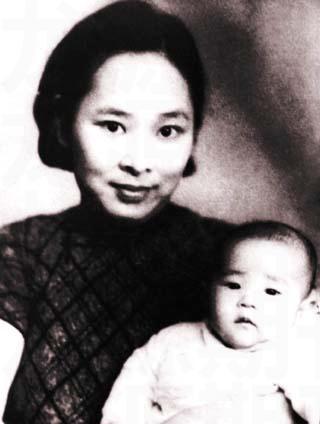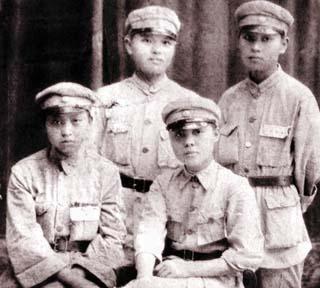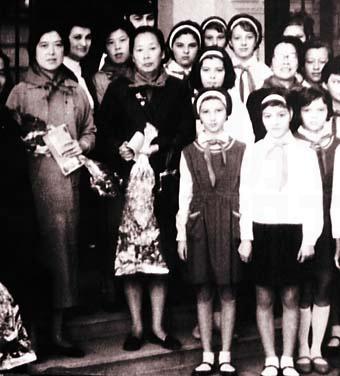A Brilliant Woman
2009-05-31FangXiaoning
Fang Xiaoning



Zeng Guofan (1811-1872) and Zeng Guoquan (1824-1890) were prominent court officials in the late years of the Qing Dynasty (1644-1911). The two brothers played a key part in this part of Chinese history. They are well known historical figures in China. Zeng Xianzhi (1910-1989) was a descendent of Zeng Guoquan. She was one of the few women from the Zeng family that are well known in the country.
A photograph taken on October 1st, 1949 at Tiananmen Rostrum shows what Zeng Xianzhi did that day. Madam Song Qingling walked after Mao Zedong and Zhu De up a flight of steps to the Tiananmen Rostrum to attend the founding ceremony of the Peoples Republic of China. Walking together with Madam Song Qingling was Zeng Xianzhi.
Madam Song Qingling, the wife of Dr. Sun Yat-sen, decided to accept the invitation jointly issued by Mao Zedong and Zhou Enlai for her to attend the founding ceremony. Madam Song Qingling was a very special person and needed to be treated reverently. In order tomake Madam Songs stay in Beijing comfortable, The General Office of the Central Committee of the CPC thought chose Zeng Xianzhi to be the receptionist for Song during her visit to Beijing. The choice was natural: Zeng Xianzhi had first met Madam Song in 1927 when she took part in Guangzhou Uprising. Zeng Xianzhi ran around Beijing and found a two-storied house as a temporary residence for Madam Song. Zeng Xianzhi made all the decisions for the furniture and other house arrangements.
Zeng Xianzhi had a strict upbringing. A brilliant girl, she passed entrance examination successfully and got herself enrolled into Hunan Provincial First Womens Normal College at the age of 13. More than academically brilliant, Zeng also was a good basketball player and a singer of Peking Opera arias.
She signed up in late 1926 when Wuhan Branch of the Central Academy of Military and Political Science decided to enroll women cadets. No women cadets had ever been enrolled in China before. The news spread fast. ZengXianzhi got herself enrolled with very high scores. So she became one of the first women cadets of the country. Crowds came in to watch women cadets training. Zeng Xianzhi commented years later that women soldiers set a vivid example to pedestrians that women and men were equal by marching on the streets through the town of Wuhan.
Zeng and other women cadets were on the Western Expedition. In the summer of 2007, Zeng as a secretary of the cadet regiment fought in the Guangzhou Uprising. From then on, she fought for the founding and construction of the Peoples Republic of China all her life.
Her colleagues all remembered her as a woman living a simple life in a dorm of the Womens Federation. She had only two pictures in her room: she was a 17-year-old soldier in one picture and she was holding her son in Hong Kong in 1927. Her colleagues all remember her as a woman of kindness and strength.
When she came all the way to Yanan, the central revolutionary base in the late 1930s and early 1940s, she was astonished to find that her husband was remarried to another woman. She was not derailed by the unexpected change in her life. She still followed her schedule and did all the reports. In all these decades and in all these political movements, she protected as many as colleagues as possible. During the Cultural Revolution, she was thrown into prison and she did manual work every day there. In 1974, her son came to visit her in a prison in Hebei Province. He was astounded to see her, sick and withered. He was heartbroken. He wrote a letter to Mao Zedong afterback in Beijing.Two days later, Zeng Xianzhi was released from the prison and received medical treatment.
I interviewed GuanMei in 1988.Guan worked as a secretary for Madam Song Qingling a few years and then for Zeng Xianzhi for decades. She was a graduate from Yenching University with a masters degree in education. She did field studies on education in seven European countries. In the early years of the Peoples Republic, the Womens Federation set up a nursery to relieve the women cadres of their daily care. Guan was put in charge of the nursery. Some people grumbled that the womans past was suspicious and that she was not the best choice for the descendents of the revolutionaries. Zeng Xianzhi put her foot down and said that Guan Mei was in charge of the nursery.
Since the founding of the Peoples Republic of China in 1949, she worked as a leader of the Womens Federation. She was a deputy of the first National Peoples Congress, a national committee member for the third, fourth and sixth CPPCC, and member of the standing committee of the national committee of the fifth CPPCC. □
